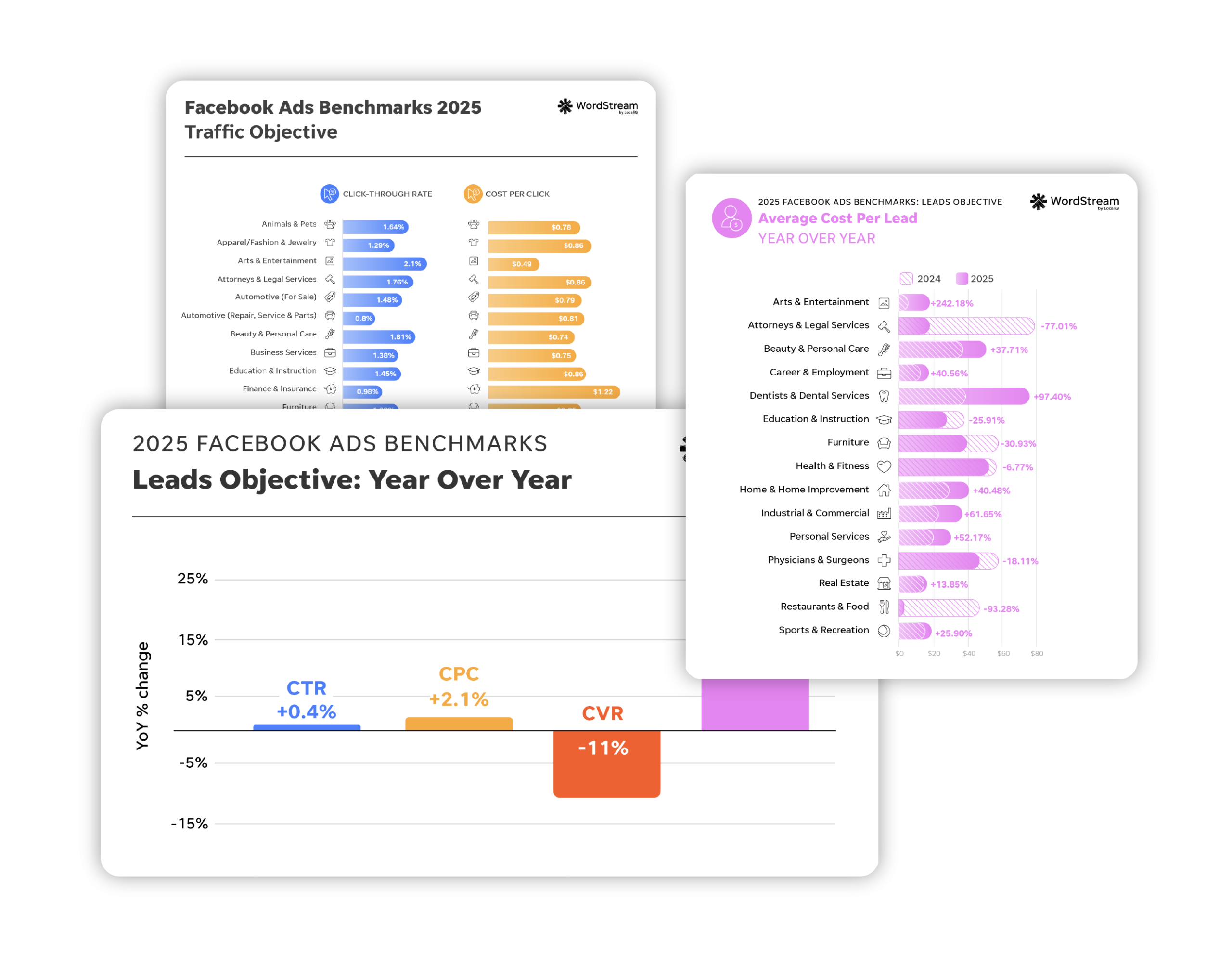Instagram is an excellent platform for brands to reach consumers who are interested in learning about new products, services, and other offerings. With Meta’s ad targeting, you can get in front of your audience when they’re most receptive. But when you’re targeting your audience, you want to make sure you’re making the most of those views. And you can do this by writing Instagram ad copy that converts like crazy.
With this complete walkthrough of Instagram ad copy benefits, tips, and examples, we’ll uncover how your Instagram ad copy can make or break your Meta advertising experience.
Contents
- Why your Instagram ad copy is so important
- Tips for writing your business’s best Instagram ad copy
- Next steps: how to start writing Instagram ads that convert
Why does Instagram ad copy matter?
Instagram is primarily a visual platform, so it’s easy to wonder why you should be spending time improving your copywriting rather than focusing on your videos, photos, and graphics.
Well, a study on the impact of Instagram caption length found that a longer caption directly correlated with more engagement. This is in organic posts, rather than ads. But it goes to show that even on a platform dominated by visuals, your copy matters.
In terms of Instagram ads specifically, it’s also been found that in-feed ads perform better than Stories ads. They found that the click-through rate (CTR) for feed ads on Instagram ranges between 0.22% and 0.88%, and the CTR for Stories ads varies between 0.33% and 0.54%. A big difference between in-feed and Stories ads? The copy requirements.
Still, users report that Instagram Stories with a narrative including photos, videos, and text are the most appealing—and the most likely to get them to keep clicking through.

The bottom line? Spending time writing Instagram ads is worth it—and can help with your conversion numbers.
🚨 Looking for more data on the average performance of Meta ads in your industry? Download our latest 2024 Facebook Ads Benchmarks Report for free here!
12 tips for writing high-converting Instagram ad copy
Here’s how you can start writing Instagram ads that guarantee increased conversion rates for your business.
1. Stick to Instagram ad guidelines
The first step to writing Instagram ad copy that converts is sticking to the guidelines. There’s no sense wasting your time writing a quippy narrative description that’s going to get cut off before the product is mentioned—or, say, name-dropping that celebrity if it isn’t going to make the strict character limit and grab some eyes in the feed.

Cuddle + Kind makes sure Jessica Alba is visible in that copy.
Here’s an overview of the character limits to keep in mind for your Instagram ad copy.
| Ad type | Character limits |
| Instagram feed ads | Primary text: 125 characters
Headline: 40 characters Max number of hashtags: 30 |
| Instagram feed video ads | Primary text: 125 characters
Maximum number of hashtags: 30 |
| Instagram Explore ads | Primary text: 125 characters |
| Instagram Stories ads | Primary text: 125 characters |
| Instagram Carousel ads character limits | Primary text: 125 characters
Maximum number of hashtags: 30 Landing page URL required |
| Instagram Reels ads | Primary text: 72 characters |
Keep these guidelines in mind so that you can maximize the space you do have for your Instagram ad copy.
2. Know your goal
When you’re writing an ad, it’s important to know your goal. Do you want to persuade a customer to click a link and complete a purchase? Do you want a new customer to learn about your services? The way you’d approach writing the copy for these two examples would be really different. That’s why knowing your goal before writing the copy is key.
When you’re advertising on Instagram, you’ll set objectives for your ads. This keeps the goal clear while you’re creating the ads, when Meta is serving them to viewers, and when you’re measuring their performance. Here are the ad objectives that Meta offers for Instagram:
- Awareness: If you need more people to know your brand, this is your goal. When you select this, Meta will serve your ad to the largest number of people because it’s the least targeted.
- Traffic: You want people to click a link to a specific page—whether it’s your brand’s social profile, a specific piece of content, or a product page.
- Engagement: This ad objective directs Meta to serve the ad to Instagram users most likely to engage with your brand and your brand’s content in direct messages, comments, and likes.
- Leads: This objective collects email addresses and other information from people interested in your brand, your content, and your offering.
- App promotion: If you want people to download an app, you want them to be on their phones. When you select this objective, Meta will serve your ad only to Instagram users who are on their phones.
- Sales: You want people who are ready to buy to see your ad. It’s a smaller subset, but that’s because it’s more targeted.
Selecting the right ad objective will direct Meta to serve the ads appropriately on Instagram. Keeping this goal in mind while you write will help you better persuade your audience into an action—whether it’s stopping a scroll to recognize your brand name, clicking a link, or even adding an item to a cart.
💡 Are you using the right campaign objective and ad copy for your Facebook strategy? Find out how your ads are currently performing with our free Facebook Ads Grader!
3. Choose the right CTA
In marketing copywriting, your goal is to prompt an action. When you’re writing an Instagram ad, you want to close with a compelling call to action—so it’s important to choose the right one.
Now, we’re saying that you need to “choose” the right CTA here intentionally. When you’re creating an Instagram ad, you’ll have to select a call to action based on your designated ad objective. This is limiting, but luckily there are lots of options.
Some CTAs include:
- Learn More
- Listen More
- Order Now
- Send WhatsA Message
- Send Message
- Request Time
- See Menu
- Shop Now
- Sign Up
- Subscribe
- Watch More
- Get Quote
- Apply Now
- Book Now
- Contact Us
- Download
- Get Showtimes
The options that you’ll see for an individual Instagram ad will vary depending on your ad objective.

A great example of a specific CTA with “Get quote” in this ad.
4. Speak to your audience
One of the biggest benefits of running ads on Instagram is the opportunity to reach your target audience. Instagram has over 2 billion active monthly users, so your potential customers are definitely on the app. And with Meta’s ad targeting options for Instagram, you can make sure your ads get in front of the right people.
So when you’re crafting your copy, you need to write directly for your audience specifically. What are they worried about? What are they motivated by? What will make them stop scrolling and read your full ad? What key words do you want to appear first in that caption or even in the creative?
Take this example from Piccalio, which has been on my Instagram feed for months now since I’ve been shopping for toddler towers. This brand has a great description of on its website: “Piccalio is an online children’s part-toy, part-furniture shop designed for learning and play.” The part-toy, part-furniture pieces are pricey when compared to other options on the market, Green Guard certified, and available in neutral wood tones, which appear in almost all the photos. Some are also available in other colors, including black or mint green, but these rarely make the website photos or the Instagram feed—a commitment to the brand aesthetics.
It’s no surprise that the copy in this Instagram ad is also an excellent commitment to the brand identity and speaks directly to its audience: Busy parents with some disposable income and a desire to help their toddler learn in a fun, safe setting. And maybe without adding any more bulking plastic clutter or garish bright colors to their home.

The ad copy urges the reader to “find out” for themselves why the Helper Tower is beloved by so many parents who made the purchase for their own kids. It explains that this tower will help you teach your child valuable skills in the kitchen. Here, the wording is particular. It doesn’t say that this tower will help your kid learn—it promises the opportunity to spend quality time while accomplishing daily household chores. This connects directly to the brand’s promise to combine learning with play—and the ad copy is speaking directly to those busy parents.
5. Use your brand voice
There are more than 200 million business accounts on Instagram. Most users follow multiple business accounts, according to the social media platform. And anyone who has logged into Instagram knows how often ads appear in your feed, Stories, and explore page content.
With so much brand content, you want to make sure yours stands out. Using your brand voice in your Instagram ad copy will help.
If you haven’t already, now is a great time to determine your brand voice. Is it silly or serious? Do you use emojis sparingly or all the time? Do you use phrases and slang, or are you a stickler for full sentences and punctuation, even on Instagram? These decisions all help create a sense of your brand personality, which will help your audience connect with you and help you stand out on Instagram.

Revival’s brand voice is confident and casual, with the made up “everything-proof” and the “better” repetition.
6. Focus on pain points
If your goal is to generate leads or encourage a sale, writing Instagram ads that highlight how your product or service will alleviate your potential customer’s pain points will help boost your conversion.
A pain point is a specific problem that your potential customers are grappling with. By identifying this problem, you can better position your solution as the solution.
I love this example from Trashie, a clothes recycling program with bright, youthful branding.

The in-feed video ad shows how to easily open the bag, fill it with your clothing, and then send it back. But the caption? The recycle emoji. The camel case-like capitalization. The yelling ALL. It feels so casual, just like the chatty video. That copy speaks to a pain point many environmentally conscious consumers have with donating clothing—a very specific potential customer who would be motivated to click the CTA to order.
7. Feature user-generated content
Instagram is an amazing example of an app that’s built on social proof to drive sales. Influencers cultivate parasocial relationships by sharing personal content as well as brand or affiliate content, which can give their recommendation weight closer to that of a friend than a celebrity endorsement.
But influencer marketing isn’t the only social selling that’s going on. Brands benefit from the engagement of their audience. Whether it’s enthusiastic comments on a new product post or tagged user-generated content.
When you have your customers selling your product or service for you? Use that. Get their permission, reshare, and write your Instagram ad copy to emphasize their points.

Not an ad, but an adorable example of user-generated content on Piccalio’s Instagram.
8. Leverage social proof
Even if you don’t have great user-generated content yet, you can still use social proof in your Instagram ad copy to encourage leads, sales, or even engagement to learn more about your offering.
You could use the number of reviews or the number of purchases—these all imply the number of people using and benefiting from your offering. You could also call our specific happy customers, especially if they’re recognizable. (That Jessica Alba call-out above? Another example.) You could also feature your reviews or testimonials themselves.
Here’s a great example from Blueland.

The graphic contains the review, which praises the company’s high-quality, plastic-free cleaning solutions. Then Blueland uses the Instagram ad caption to emphasize these two points by calling out its efficacy, ingredients, and elimination of single-use plastics.
9. Get creative with AI
It’s easy to get stuck when you’re writing copy for your brand. Whether you’re staring at a blank page and can’t figure out where to start or you’re churning out copy that all sounds the same, you can get some help from AI.
AI copywriting tools are great ways to jumpstart your drafts and get some creative inspiration. With a tool like ChatGPT, you can enter a prompt with the object, the character limits, and the content to come up with a dozen starter ad captions. Or, if you’re already using a social media management platform that offers this, you can take advantage of the AI assistants to improve your copy or generate alternatives.
Just remember: You can’t quite copy and paste and call it a day. View this as a first draft. You still need to review, revise, and proof this copy.
10. Skip hashtags—unless it’s for your brand
When you’re writing Instagram ads, you don’t need to include hashtags. They’ll take up your character limit, and they won’t impact your reach. Because it’s an ad, it won’t show up organically when a user searches a given hashtag.
The only caveat? If using hashtags irreverently or enthusiastically is central to your brand. If it’s a part of your bubbly, Gen-Z-targeted personality, be sure to include them. If a hashtag is the perfect addition to your quippy one-liner in the ad caption? Put it in. Otherwise? You’re good to skip these.
11. Test your Instagram ad copy
These are all great strategies for writing Instagram ads that convert. But the ultimate deciding factor is going to be how your audience responds. That’s why it’s a good idea to test your Instagram ad copy.


Example copy test via Facebook ads.
Luckily, Instagram makes this easy to do within the platform. When you’re creating an ad, you can select an A/B test. Focus on testing the copy—the caption, the copy in the creative, or the CTA—to see which version performs better with your audience. Short, descriptive captions, or longer, voicey sentences. Clean copy or emojis and all-caps emphasis. The only way to determine which copywriting tactics will lead directly to more conversions is to test it out on your audience.
12. Consider your Instagram ad copy in your creative process
We’ve been talking a lot about how to improve your ad with stronger copy that’s speaking to your audience, emphasizing your brand voice, and more. But make sure that writing ad copy isn’t always just an afterthought. Whenever it’s possible, approach your ad holistically. How does the copy improve the visuals? How should the visuals be edited or arranged differently to echo the copy? These considerations will improve the end product.
Plus, one thing you’ll notice about all these examples is that copy appears in the creative—almost always.
Here are two Instagram ads with solid photos. One uses copy in the ad creative, and the other doesn’t.

Lovely house color but as an ad? Unfortunately, so skippable.

The picture? Great. The picture and the copy? Chef’s kiss.
Take this as guidance when you’re developing your own Instagram ads. If you’re working on a marketing team with a designer or outsourcing creative development to a freelancer, work closely on the visuals and include copy as a part of the process. And you’re a one-person social media team (hat’s off to you), make sure when you’re taking photos or working on new ad creative, think about the copy appearing alongside the visuals.
Write Instagram ads that convert
Like we said earlier, Instagram is primarily a visual platform. But that doesn’t mean your words don’t matter. This is especially true when it comes to your ad copy. So take the opportunity to make that copy stronger, more compelling, and more persuasive (and check out these examples). Don’t stop there, get tips on writing the best Google Ads, too.
To recap, here’s how to write high-converting Instagram ad copy:
- Stick to Instagram ad guidelines
- Know your goal
- Choose the right CTA
- Speak to your audience
- Use your brand voice
- Focus on pain points
- Feature user-generated content
- Leverage social proof
- Get creative with AI
- Skip hashtags—unless it’s for your brand
- Test Instagram ad copy
- Include copy in your creative process
Now that you’ve got these tips to work with, get started writing some strong Instagram ad copy, testing it out for your audience, and, most importantly, improving those conversion rates.








